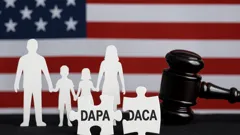133
9
5 minutes
Suggested Articles

First-generation Ivy Leaguers triumph over unique college challenges
Discover key insights, life hacks, and data-driven tips for first-generation college students thriving in prestigious U.S. universities. Find practical strategies, unique challenges, and fresh perspectives essential for student success.

Families face hard choices as new rule narrows Head Start access for immigrant children
News & Updates

Federal funding delays threaten vital support for US students and schools
News & Updates

Parents see children gain confidence and lifelong friends at today’s inclusive summer camps
Volunteer

Parents and educators unite to fight SNAP-Ed cuts and protect kids’ health
News & Updates

US Birthright Citizenship Debate: What Changes Could Mean for Millions
News & Updates

New court order speeds special education help for families nationwide
Civic Education

Homeschool parents embrace freedom as lawmakers spark a new regulation debate
News & Updates

SNAP and CalFresh cuts hit families hard as food insecurity surges
News & Updates

Education advocates unite to keep special education oversight strong and fair
News & Updates

DAPA and DACA: Understanding Their Role in U.S. Immigration Policy
Civic Education

First-generation Ivy Leaguers triumph over unique college challenges
Hiring

Americans brace for possible Social Security cuts that reshape retirement
News & Updates

Why this Florida data leak changes how we think about privacy
News & Updates

Build your own AI chatbot and unlock hands-on tech superpowers
Resources & Tools

How to outsmart hidden medical expenses in your golden years
Civic Education

California workers secure jobs this summer with new 2025 laws
Hiring
 Love Women Vibes
Love Women Vibes

Comments